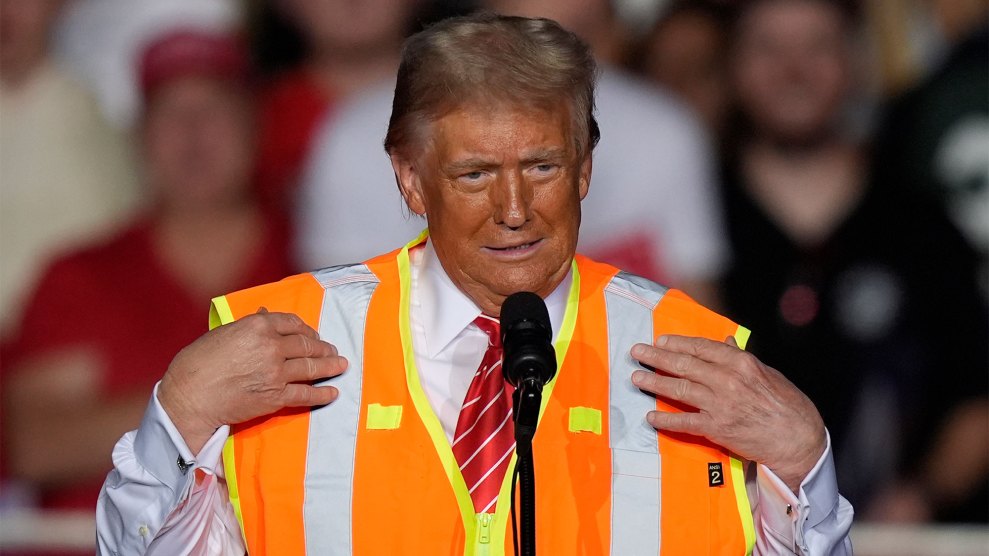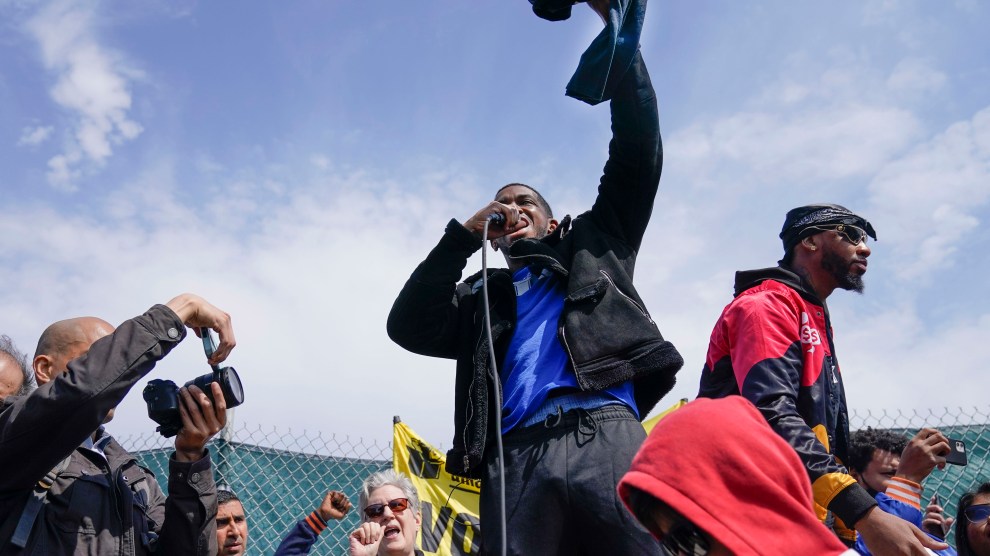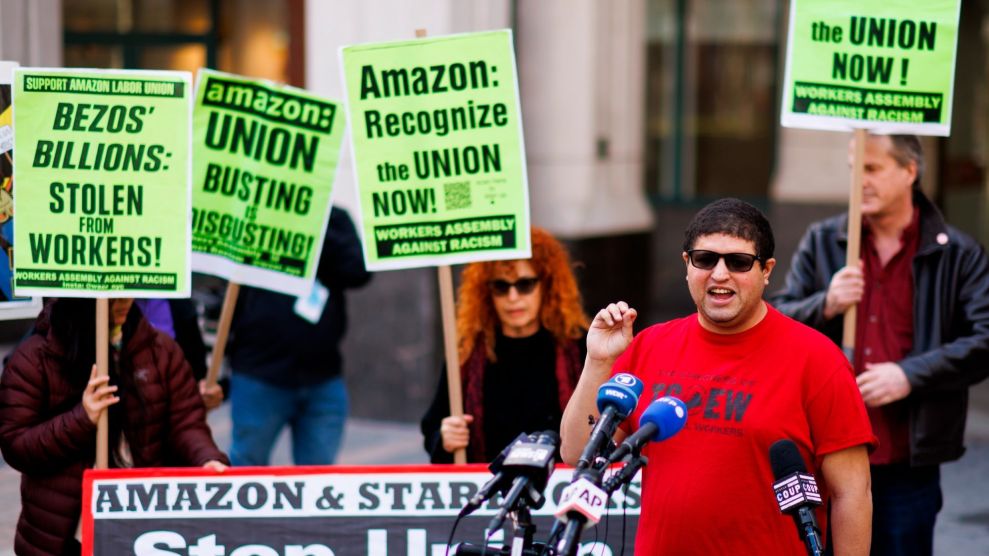
Alex Brandon/AP
President Donald Trump has plunged the National Labor Relations Board—an independent federal government agency that enforces laws on collective bargaining and unfair labor practices—into chaos, risking the enforcement of workers’ rights across the country.
On January 28, Trump fired General Counsel Jennifer Abruzzo. Soon after, he pushed out Democratic Board member Gwynne Wilcox. While Abruzzo’s firing was not a surprise—she was a Biden appointee who expanded labor rights—the dismissal of Wilcox was far outside the norm. A president had never removed a Board member prior to the end of their term. (Wilcox has since filed a lawsuit against Trump, arguing that her termination violated the National Labor Relations Act of 1935, which states that Board members can only be removed “upon notice and hearing, for neglect of duty or malfeasance in office, but for no other cause.”)
In early February, the purge continued. Trump fired Acting General Counsel Jessica Rutter, who had just replaced Abruzzo, and appointed William Cowen, a conservative who briefly served as a Board member under George W. Bush. He then dismissed Susan Tsui Grundmann, the Chair of the Federal Labor Relations Authority, an independent federal agency that oversees labor relations between the federal government and its employees. During her term, Grundmann fought against budget cuts that she asserted would force furloughs amid a rise in federal employee unionization.
The shake-up is particularly alarming because—by leaving only two members on the five-member Board—the Trump administration has eliminated a quorum, effectively preventing the NLRB from ruling on cases at the federal level.
Margaret Poydock, a senior policy analyst at the Economic Policy Institute, a nonprofit think tank, told me that the NLRB firings not only “essentially paralyze” the agency from making decisions but also “destroy its independence.”
The NLRB maintains independence in part because its Board members’ terms are five years. This is intentional, Poydock says, and allows members to serve between administrations, thus shielding them from presidential interference. But because Trump can now fill three seats, this may no longer be the case.
Poydock points to the letter firing Abruzzo and Wilcox as a glimpse at what is to come. Trent Morse, the deputy director at the Office of Presidential Personnel who wrote on Trump’s behalf, stated that he did not think the pair could “fairly evaluate matters before them without unduly disfavoring the interests of employers.”
Such language furthers concerns that Trump wants the NLRB to take a pro-business stance. In his first term, the Board and the Trump-appointed General Counsel Peter Robb systemically reversed workers’ rights to form unions and collective bargain with their employers.
In September 2019, the NLRB lowered the standard for employers to demonstrate that they followed collective bargaining agreements when making unilateral changes to employment policies like safety and disciplinary action, thus decreasing the grounds for employees to file unfair labor practice charges.
Firing a Board member before their term is up and leaving three Board seats vacant to freeze it out of a quorum “is a different animal” that “stops the enforcement of the law, period,” said a labor official.
Just this week, the Department of Justice said that it would no longer defend members of the NLRB—as well as the Federal Trade Commission and Consumer Product Safety Commission—from being fired by the president without good reason. The DOJ is requesting that the Supreme Court overturn its 1935 decision in Humphrey’s Executor v. United States, in which the high court declared that Congress could block President Franklin D. Roosevelt from dismissing an FTC commissioner due to a disagreement in political views. Overturning the decision may allow Trump to increase his executive power and bypass checks and balances.
This has left labor leaders who communicate with the Board alarmed.
“While regions can go through the ministerial function of scheduling an election, certifying an election, and identifying an unfair labor practice, without a functioning NLRB, there are no repercussions [for employers], there’s no enforcement, and it all just stops,” said Andrea Hoeschen, the general counsel and an assistant executive director at Actors’ Equity Association, a labor union that represents over 51,000 professional actors and stage managers.
During our phone conversation, Hoeschen brought up Whole Foods, which is owned by Amazon, requesting in early February that the NLRB disregard the union election results at a Philadelphia store (in part due to Abruzzo and Wilcox’s departures). Although a regional NLRB official could reject Whole Foods’ complaint and certify the union win, that decision would hold little significance until at least one Board member is nominated and confirmed.
This recent push is part of a broader assault on the NLRB.
After the federal agency accused Amazon, Starbucks, and Trader Joe’s of illegally impeding its workers’ unionization efforts and asserted that SpaceX unjustly fired eight employees for criticizing their CEO, Elon Musk, the four companies attacked the federal agency in separate lawsuits, claiming that its structure violates the separation of powers by allowing the NLRB to wield legislative, judicial, and executive authority—including penalizing companies without a jury trial. The lawsuit could result in a decision to undo the NLRB as we know it—even ruling the board unconstitutional.
These legal battles run counter to the GOP’s efforts to portray itself as the class-conscious party. “Five, ten years from now,” Donald Trump told Bloomberg Businessweek about the future of the GOP prior to his 2016 election victory. “You’re going to have a worker’s party.” At the Republican National Convention last year, Sean O’Brien, the general president of the International Brotherhood of Teamsters, talked to the crowd about large corporations firing employees who tried to organize: “This is economic terrorism at its best.”
But as my colleague Tim Murphy pointed out, billionaire union-buster Elon Musk donated at least $288 million to help elect Trump and other Republican candidates this past election. “It was not the rise of the workers,” he wrote. “It was the restoration of the bosses.”
This contradiction promises detrimental consequences for the most vulnerable workers as the GOP’s working-class policy hinges on issues like anti-immigration—developments we are already seeing today. Instead of conservatives pointing the finger at corporations and arguing for helping workers through actions like facilitating union formation, the rhetoric seems to mostly align with blaming immigrants. As my colleague Isabela Dias wrote, JD Vance claimed numerous times on the 2024 campaign trail that immigration leads to lower wages for American workers.
Hoeschen also highlighted how she has a union election petition, unfair labor practice charges, and a 10(j) injunction pending for male revue workers who organized last year at the Chippendales location in Las Vegas. While staff at NLRB’s Region 28 in Phoenix, Las Vegas, and Albuquerque have been “very responsive,” Hoeschen said they require authorization from either the NLRB or the General Counsel in order to request 10(j) injunctive relief, which aims to temporarily stop certain unfair labor practices while administrative judges and the Board litigate the dispute.
According to Hoeschen, Rutter had sent out guidance on how labor cases would move forward without a Board quorum, but the Trump administration removed her hours after she distributed the memo. Cowen, the Trump-appointed replacement, has yet to put forward any guidelines.
“I’ve dealt with two different regions and the compliance office in DC,” Hoeschen told me last week. “The people working there are not promising me they’ll be able to be responsive the next day…We don’t know how long they’re going to be there.” This week, Hoeschen updated me, saying she is no longer able to reach the DC compliance attorney.
Hoeschen says that Trump’s actions at the NLRB go well beyond the norm of a Republican administration or even his first term.
Unions are typically able to prepare for a new Republican majority in the Board, but firing a Board member before their term is up and leaving three Board seats vacant to freeze it out of a quorum “is a different animal” that “stops the enforcement of the law, period.”
Hoeschen emphasized that what’s happening is antidemocratic and goes against precedent; no one has ever tried to repeal the National Labor Relations Act in court.
“All those people who voted last year—we heard so much about Republicans making inroads into the working class—those people haven’t gone away with inauguration,” Hoeschen said. “All those people who filed for election petitions and organizing drives last year are still here…That’s not representative of where Americans are right now.”

















